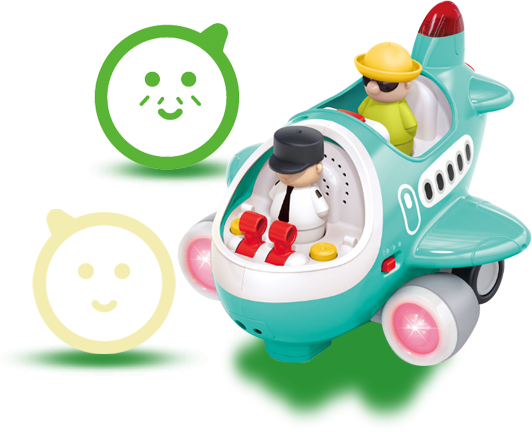
Terrible Twos: How to Deal with Your Baby’s First Period of Rebellion?
- Categories:Parent Resource Center
- Author:
- Origin:
- Time of issue:2022-03-02 15:26
- Views:0
Terrible Twos: How to Deal with Your Baby’s First Period of Rebellion?
(Summary description)"It drives me crazy to look after my 2-year-old baby. Feel like I’m losing control of him", this is the true feeling of many parents...
- Categories:Parent Resource Center
- Author:
- Origin:
- Time of issue:2022-03-02 15:26
- Views:0
Terrible Twos: How to Deal with Your Baby’s First Period of Rebellion?
"It drives me crazy to look after my 2-year-old baby. Feel like I’m losing control of him", this is the true feeling of many parents. Parents can't understand why their two-year-old suddenly becomes an unreasonable baby who has to do everything against his parents. Actually, the baby's first rebellious period comes when you have such confusions!

What is the first period of rebellion?
Babies’ first period of rebellion usually occurs around the age of two, so it is also called "terrible twos".
Babies in this period like to act against adults no matter what they do, and answer "No! No! No!" no matter what they are asked. Besides, they may also be reluctant to share the toys or snacks with their brothers and sisters. This makes parents crazy.

Why It Happens
Babies around the age of two are in the stage of various sensitive periods in their growth and development. They gradually have self-awareness and are establishing order and habits with the outside world. As parents, we should respect babies’ wishes and understand the reasons behind their "unreasonableness".

Self-consciousness
Babies' self-awareness begins to sprout around one and a half years old, and becomes stronger after two years of age. Coupled with the enhancement of language skills, they begin to learn to express and defend their own ideas, and sometimes even deliberately oppose their parents. For example, parents want the baby to eat the food first, but, the baby wants to drink some water instead. Parents want to take the baby out to play, but, the baby said he just want to stay at home.

Order sensitive period
Babies in the sensitive period of order have their own set of orders. Besides, they have strict standards for the observance of the order. Not only will they do things in accordance with the order, but they will also require the adults around them to follow their rules.
He will let you know your "violation" by crying when you do not follow his order. For example, he may ask you to sit in a fixed position of the dinner table when eating, or, he will tell you to put on the left foot first, then the right foot when wearing the shoes. He will be very angry if you “break the rules”.

Property Sensitive Period
There may be parents who don't understand the baby's "sensitive period of property rights". If it is replaced by "stingy", the parents will immediately understand and feel the same way. During this period, the baby will often say "this is mine". In addition, the baby also has a strong sense of "territorial" about his own things, and he does not want others to touch or share it with others.
Parents sometimes deliberately take the baby's things in order to tease the baby. The baby is likely to start crying to protect his own things, and even show "aggressive behavior". All these behaviors of the baby are just to protect "their own things".

Turn your "Terrible Two" into a "Cute Two"
After understanding the reasons for the baby's first rebellious period, parents can try to use the following methods to make your "Terrible Two" into a "Cute Two". In fact, it can be very simple.

Learn Emotion Management with Your Baby
During this special period, parents need to listen carefully to the babies’ words, observe the babies’ behavior, and guide them to recognize, manage, and improve their emotions. For example, parents can help babies learn to express their feelings in an appropriate way through some colorful picture books, simple and interesting parent-child games, etc.
At the same time, parents should also learn to manage their own emotions, respect the baby's feelings, and deal with the baby's "terrible two" patiently, tolerantly and calmly.

Let Children Make Their Own Decisions
Allowing your babies to make their own decisions can effectively reduce babies’ negative emotions. For example, if parents want their babies to eat more vegetables, they can provide a variety of selections such as tomatoes, green vegetables, radishes, etc., so that babies can choose the vegetables they have interest. Do not force the baby to eat a certain vegetable, which will make the baby feel un-respected. Enjoy the process of making their own decisions, and your babies will be more willing to eat vegetables.

Give Your Baby the Right to Say No
Many parents want their words to be deterrent and don’t want their baby to go against their will. But, babies are also independent individuals with their own ideas. Therefore, parents should give the baby the right to say "no", so that the baby feels respected and accepted, so that the baby can be more willing to express his thoughts.

Attention Diversion
For the "stubborn behavior" of two-year-old babies, sometimes it is possible to divert their attention to avoid them being too entangled in one thing. For example, when the baby stubbornly wants to buy a certain toy and the parent expressly refuses, the baby starts to cry. At this time, paren

PARENT RESOURCE CENTER


Copyright © 2022 Guangdong Edukiddo Innovative and Education Technology Co., Ltd.
Add: Right of Guangyi Street Office,North of Guangyi Dengfeng Road,
Chenghai District,Shantou, Guangdong, PR.China
Tel: +86-754-85832721
Mail:info@huiletoys.cn


